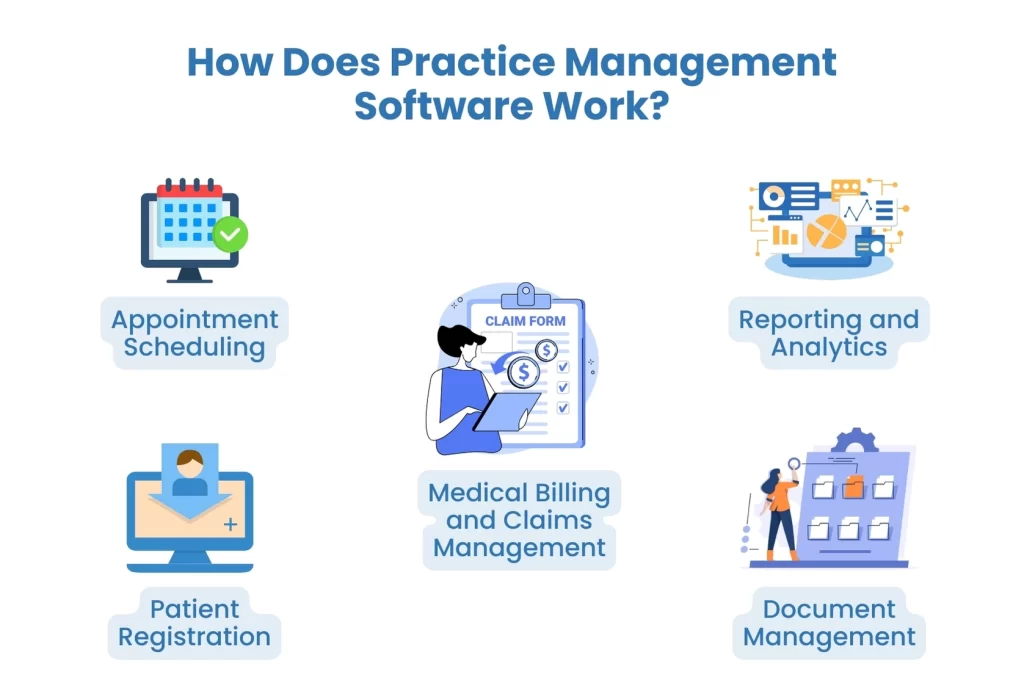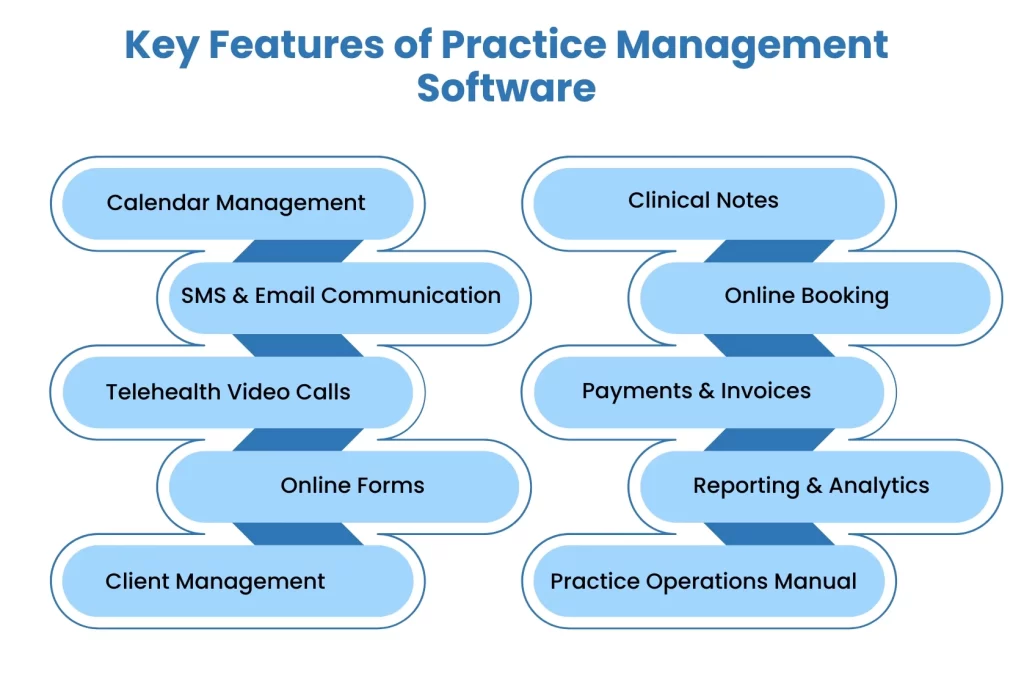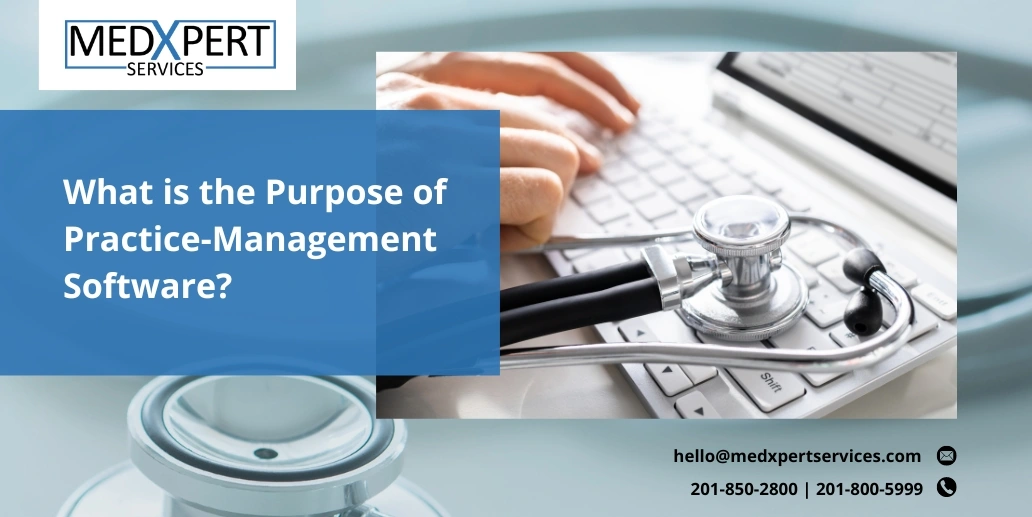In the healthcare industry, efficiency is essential. Imagine a scenario where patient information gets lost in piles of paperwork or appointments are missed due to scheduling errors. Such instances not only compromise patient care but also hinder the smooth functioning of healthcare facilities.
This is where Practice Management Software (PMS) comes into play. PMS is a comprehensive solution designed to streamline administrative tasks in medical practices, clinics, and healthcare organizations. Its ability to automate repetitive tasks and centralize critical information not only saves time and resources but also enhances the overall quality of patient care.
In an era where precision and speed are non-negotiable in healthcare delivery, the importance of PMS cannot be overstated.
What is Practice Management Software?
Practice management software (PMS) is a specialized application designed to help medical practices manage their day-to-day operations more efficiently. It integrates various administrative and clinical functions, offering a comprehensive solution for tasks such as appointment scheduling, patient registration, medical billing, and reporting. Typically,
PMS includes features that facilitate the management of patient demographics, insurance claims, and financial records, ensuring that all essential information is easily accessible and organized.
By consolidating these tasks into one platform, PMS helps healthcare providers maintain smooth, streamlined workflows, reducing the time and effort spent on manual administrative duties and allowing for a more patient-centric approach to care.
How Does Practice Management Software Work?
Practice management software (PMS) works by offering a wide range of functionality and key features tailored to meet the specific needs of medical practices. PMS serves as a centralized platform that automates and streamlines various administrative and clinical tasks, enhancing efficiency and productivity within healthcare settings.
Some of the key features and functionalities of practice management software include:

Appointment Scheduling: PMS enables healthcare providers to efficiently manage patient appointments, including scheduling, rescheduling, and cancellations. It allows staff to view and update appointment calendars in real time, reducing scheduling conflicts and ensuring optimal use of available time slots.
Patient Registration: With PMS, patient registration becomes a seamless process, allowing staff to capture and maintain accurate demographic information, insurance details, and medical history electronically. This not only saves time but also minimizes errors associated with manual data entry.
Medical Billing and Claims Management: Practice management software streamlines the billing process by automating tasks such as claim generation, submission, and tracking. It helps healthcare providers accurately code procedures, verify insurance coverage, and process payments, thereby improving revenue cycle management and reducing claim denials.
Document Management: PMS provides a centralized repository for storing and managing patient records, medical charts, and other relevant documents electronically. This feature enables easy access to patient information, facilitates collaboration among healthcare professionals, and ensures compliance with regulatory requirements.
Reporting and Analytics: Practice management software offers robust reporting and analytics capabilities, allowing practices to generate various financial, operational, and clinical reports. By analyzing key performance metrics and trends, healthcare providers can identify areas for improvement, monitor practice performance, and make informed decisions to optimize outcomes.
What are the Benefits of Scheduling with Practice-Management Software?
Scheduling with practice-management software (PMS) offers a multitude of benefits that significantly enhance the efficiency and effectiveness of healthcare practices. Here are some key advantages:
Improved Patient Experience:
With PMS, patients can conveniently schedule appointments online, reducing the need for lengthy phone calls and wait times. Additionally, automated appointment reminders via email or text message help patients stay informed and reduce the likelihood of missed appointments, enhancing overall patient satisfaction.
Optimized Provider Time:
By automating appointment scheduling and reminders, PMS frees up valuable time for healthcare providers to focus on patient care rather than administrative tasks. Providers can spend less time managing their schedules and more time delivering quality care to their patients.
Enhanced Staff Productivity:
PMS simplifies the scheduling process for administrative staff, allowing them to efficiently manage appointments, allocate resources, and coordinate patient visits. This increased productivity translates into smoother workflows and improved staff satisfaction.
Real-Time Updates and Accessibility:
Practice-management software offers real-time updates to appointment schedules, ensuring that staff have access to the latest information at all times. This accessibility enables staff to respond promptly to changes and emergencies, resulting in more efficient practice operations.
Billing Integration:
Many PMS platforms integrate with billing software, allowing staff to schedule appointments and generate billing statements in one system seamlessly. This integration improves accuracy, reduces errors, and accelerates the billing process, leading to faster reimbursement and improved revenue cycle management.
Difference Between EHR and Practice Management Software
When discussing the healthcare technology landscape, it’s crucial to understand the distinction between Electronic Health Records (EHR) and Practice Management Software (PMS). While both systems play integral roles in healthcare administration, they serve distinct purposes and offer different functionalities. EHR primarily focuses on capturing and storing patient health information electronically, including medical history, diagnoses, medications, and lab results.
On the other hand, PMS is specifically designed to streamline administrative tasks within medical practices, such as appointment scheduling, billing, and financial management.
| Feature | Electronic Health Records (EHR) | Practice Management Software (PMS) |
| Patient Health Records | Centralized electronic records containing comprehensive patient health information, including medical history, diagnoses, medications, allergies, and lab results. | Focuses on administrative functions such as appointment scheduling, patient registration, insurance verification, and billing. May include limited patient health information necessary for administrative tasks. |
| Clinical Documentation | Enables healthcare providers to create, update, and share clinical documentation, including progress notes, treatment plans, and referrals. | Does not typically include clinical documentation features; primarily focuses on administrative tasks related to practice management. |
| Interoperability | Facilitates interoperability by allowing sharing of patient health information across different healthcare settings, promoting continuity of care and collaboration among providers. | May integrate with EHR systems to exchange patient demographic and scheduling information. |
| Regulatory Compliance | Designed to meet regulatory requirements such as HIPAA and Meaningful Use, ensuring the security and privacy of patient health information. | Helps practices adhere to billing regulations and coding standards, facilitating accurate claims submission and reimbursement. |
| Patient Engagement | Offers features for patient engagement, such as online portals for appointment scheduling, access to medical records, and secure messaging with healthcare providers. | May include patient communication tools for appointment reminders and billing inquiries but typically focuses on administrative rather than clinical interactions. |
Key Features of Practice Management Software
Practice management software (PMS) is a comprehensive solution designed to streamline administrative tasks and improve operational efficiency within healthcare practices. Here are the key features that make practice management software indispensable for modern medical practices:

1. Calendar Management: Efficient appointment scheduling is crucial for optimizing clinic resources and minimizing scheduling conflicts. PMS offers flexible calendar management tools, allowing one-click appointment management across multiple practitioners, locations, and modalities.
2. SMS & Email Communication: Built-in communication tools enable automated appointment reminders, email, and two-way SMS messaging, enhancing patient engagement and facilitating timely communication between the clinic and patients.
3. Telehealth Video Calls: Embracing the digital future of healthcare, PMS provides end-to-end encrypted video calling solutions for remote patient consultations, ensuring accessibility and convenience without the need for logins or downloads.
4. Online Forms: Say goodbye to paperwork with online forms that automatically populate patient profiles, reducing administrative burdens and improving data accuracy.
5. Client Management: Integrated CRM solutions centralize patient data, including medical history and contact information, enhancing care coordination, accuracy, and patient relationship management.
6. Clinical Notes: Pre-prepared templates streamline clinical note-taking, reducing paperwork and saving time for healthcare providers.
7. Online Booking: Enable patients to book appointments 24/7 through client portals and online booking systems, reducing administrative workload and improving accessibility.
8. Payments & Invoices: PMS simplifies billing by generating invoices, automating payment tracking, and facilitating claims processing, ensuring smooth financial management.
9. Reporting & Analytics: Real-time insights and analytics provide valuable data on practice performance, financials, and key metrics, empowering clinics to make informed decisions and plan strategically.
10. Practice Operations Manual: Industry-first practice operations manuals offer a core set of policies and procedures tailored to meet the needs of healthcare practices, ensuring compliance and operational consistency.
Final Remarks
The purpose of practice-management software (PMS) is to revolutionize the way healthcare practices operate by streamlining administrative tasks, enhancing patient engagement, and optimizing practice performance. By offering a comprehensive suite of features such as appointment scheduling, communication tools, telehealth capabilities, and financial management, PMS empowers healthcare providers to focus more on patient care and less on administrative burdens.
With its ability to improve efficiency, accuracy, and patient satisfaction, practice management software plays a vital role in shaping the future of healthcare delivery.
















